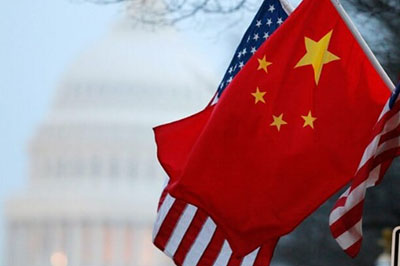by WorldTribune Staff, July 5, 2023
Those in the upper echelons of power in the United States have long held out hope that communist China would eventually liberalize and embrace Western norms and values.
In fact, Chinese leader Xi Jinping, in his relentless pursuit of China supplanting the U.S. as the top superpower, has been blamed for the horrific Covid pandemic and widespread theft of U.S. technology and intellectual property while rallying the world against Western values.
 Instead of meekly kicking the can down the road, the U.S. must project strength against what is the biggest threat to U.S. security by forcing China to repay U.S. bondholders the more than one trillion dollars it is in default on, an analysis said.
Instead of meekly kicking the can down the road, the U.S. must project strength against what is the biggest threat to U.S. security by forcing China to repay U.S. bondholders the more than one trillion dollars it is in default on, an analysis said.
“Now that the relationship with China has soured and the People’s Republic of China has become the greatest adversarial threat to the U.S. and Western security, policymakers should revisit this appalling failure of justice,” Andrew Hale, the Jay Van Andel Senior Policy Analyst in Trade Policy at The Heritage Foundation, wrote for The Hill on Tuesday.
“A private group of American citizens holds a large quantity of these gold-denominated bonds. This citizen-led group, the American Bondholders Foundation (ABF), serves as trustee with power of attorney for some 20,000 bondholders, whose bonds are valued at well more than $1 trillion,” Hale noted.
Hale cited then-UK Prime Minister Margaret Thatcher’s tough negotiation stance in 1987 on the return of Hong Kong to China which led to a British settlement agreement on Chinese bonds.
“Thatcher said that for China to have access to UK capital markets, it had to honor the defaulted Chinese sovereign debt held by British subjects. Faced with that stark choice, China agreed,” Hale noted.
The age of the U.S. bonds “is irrelevant,” Hale added. “What matters is that this is a sovereign obligation.”
For example, in 2010, the German government made its last payment for reparations from World War I. In 2015, Great Britain made payments on bond issuances that dated from the 18th century.
“The Biden administration and the U.S. Congress have a unique opportunity to enforce the well-established international rule that governments must honor their debts. Like the U.K. did in 1987, the U.S. must view the repayment of China’s sovereign debt as essential to its national security interests,” Hale wrote.
Team Biden has two avenues it can take to guarantee the repayment, Hale noted:
“The first would be to acquire the Chinese bonds held by the ABF and utilize them to offset (partially or in whole) the $850 billion-plus of U.S. Treasurys owned by China (reducing up to $95 million in daily interest paid to China). This would lower the national debt and put the U.S. in a better financial position globally.
“The second would be to pass legislation that requires China to abide by international norms and rules of finance, trade and commerce. This would include abiding by the transparency rules of capital markets and exchanges and ending its practices of exclusionary settlement, discriminatory payments, selective default, and rejection of the successor government doctrine of settled international law. If China fails to meet those obligations, it would be barred, together with its state-controlled entities, from access to all U.S. dollar-denominated bond markets and exchanges.”
Hale added: “This, again, is just common sense and would be the very thing the Chinese government would do if the situation were reversed.”
Membership . . . . Intelligence . . . . Publish
